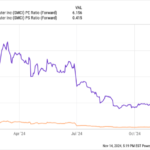Intel’s Dow Dilemma
For over a century, the Dow Jones Industrial Average has stood as a bedrock for gauging the stock market’s vitality. Since its inception in 1896 with primarily industrial players, the index has evolved into a diverse mix of 30 multinational corporations. Yet, unlike its peers like the S&P 500 and Nasdaq Composite, the Dow’s unique ranking by share price leaves companies vulnerable to expulsion.
One such underperformer on the chopping block is Intel, the chip giant whose plummeting share price places it at risk of a swift exit from this storied club. Since joining in 1999, Intel’s lackluster performance, compounded by market shifts favoring competitors like Nvidia and AMD, has made its removal almost inevitable.
Nvidia’s Dow Dilemma
As Intel faces an impending exit, the spotlight shifts to Nvidia as the presumed replacement. However, Nvidia’s recent stock split and dominant position in AI and chip technology don’t guarantee a seamless transition into the Dow. While Nvidia’s technological prowess is unquestioned, its suitability for the index is a subject of debate.
With Nvidia’s latest chips maintaining a competitive edge in AI and data centers, the company seems poised for continued success. But the Dow’s criteria, heavily leaning on share prices, may complicate Nvidia’s accession, despite its industry leadership.
As Wall Street watches this unfolding drama, the fate of these tech titans in the Dow remains uncertain. Intel’s imminent departure could mark a turning point, with Nvidia waiting in the wings, eager to prove its worth in this prestigious lineup.
Analyzing Nvidia’s Entry into the S&P Dow Jones Indices
The Dow’s Reluctance Towards Nvidia
Throughout history, the S&P Dow Jones Indices have prided themselves on a traditionalist approach, favoring companies with proven track records over those hyped by short-lived trends. While not shying away from growth stocks, the index tends to steer clear of entities overly reliant on fleeting market fads like the latest Wall Street excitement.
Over the last three decades, no groundbreaking innovation has dodged the inevitable bubble bursting phenomenon. Investors’ tendency to overestimate the swift adoption of new technologies echoes in the uncertainty surrounding the current AI landscape. With many businesses lacking solid monetization strategies for AI, skepticism looms over Nvidia’s potential to avoid being engulfed in this bubble.
Adding to the Dow’s hesitance is Nvidia’s recent 10-for-1 share split, resulting in a lower share price position within the index. Despite its colossal market value, the diminished stock price compromises Nvidia’s influence, causing it to slip down the pecking order of Dow components.

Image source: Getty Images.
Potential Replacement for Intel: Why Broadcom Fits the Bill
If Intel faces expulsion from the Dow in the near future due to its low share price, the optimal substitute may not be Nvidia. Instead, Broadcom emerges as a prime contender to diversify the iconic index.
Following a similar stock split trajectory as Nvidia, Broadcom’s recent 10-for-1 forward-stock split strategically adjusted its share price for greater accessibility. This move positions Broadcom favorably among Dow components, showcasing its adaptability to market dynamics.
Unlike Nvidia’s concentrated focus on AI, Broadcom boasts a wide-ranging product portfolio beyond the realms of artificial intelligence. With its robust sales channels and expansive offerings ranging from wireless chips for smartphones to networking solutions for data centers, Broadcom’s diversified revenue streams paint a resilient picture amidst market fluctuations.
Moreover, Broadcom’s strategic acquisitions, including Symantec and VMware, underscore its commitment to enhancing its service ecosystem and market presence. Through these ventures, Broadcom solidifies its stance as a key player in cybersecurity solutions and cloud services, aligning with the evolving demands of modern businesses.
Investment Insights: The Intel Conundrum
Before diving into Intel’s stock, investors should contemplate alternative avenues for potential growth. The Motley Fool’s expert analysts present a compelling case for exploring other lucrative investment opportunities that could yield substantial returns in the foreseeable future, highlighting the evolving dynamics of the market.
Reflecting on Nvidia’s monumental growth since its inclusion on the investment radar in 2005 poses a compelling narrative. With a modest investment back then yielding monumental returns in the present day, the importance of strategic investment choices resonates profoundly in the realm of financial decision-making.
Backed by a track record of outperforming the S&P 500 index, the Motley Fool’s Stock Advisor service equips investors with actionable insights and promising stock recommendations to navigate the ever-changing landscape of investments. Unveiling top-performing stocks and guiding portfolio construction, this service signifies a beacon of informed decision-making amid market uncertainties.
*Stock Advisor returns as of September 3, 2024





